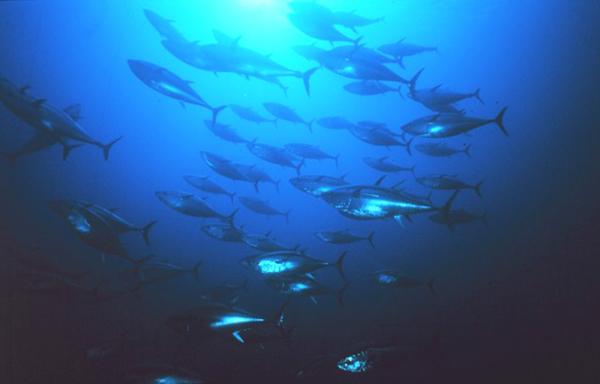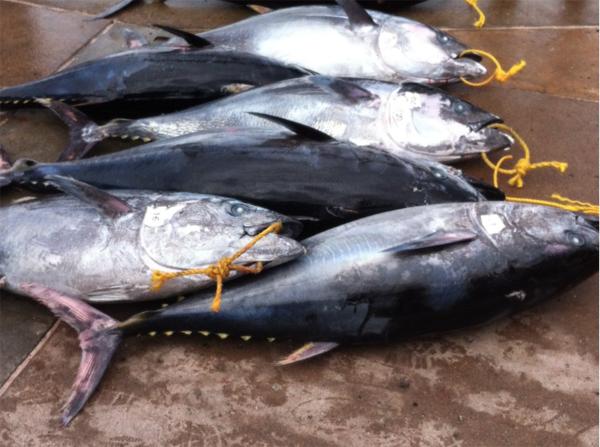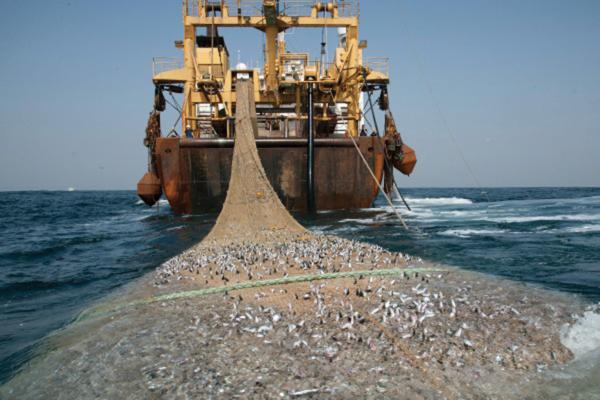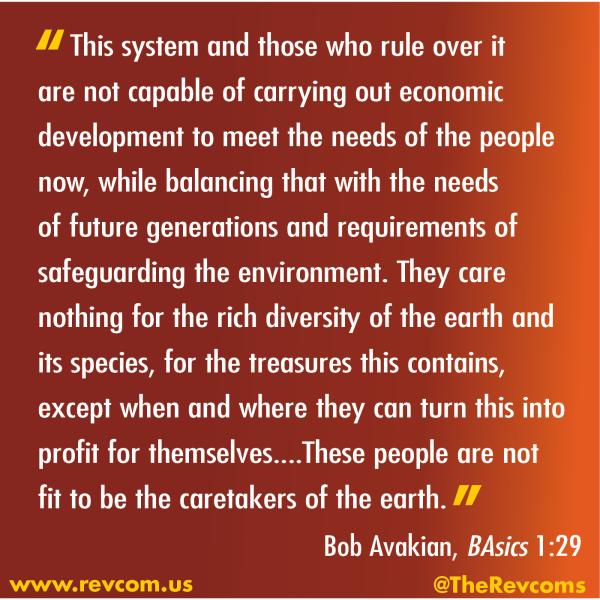“Internationalism—The Whole World Comes First.”
—Bob Avakian, BAsics 5:8“…what has come sharply into focus in the 21st century is that healthy oceans—oceans that can sustain anything like the system of life which has evolved through billions of years on the planet—are completely incompatible with the global system of capitalism-imperialism. One or the other will go. It is up to us to decide which one…”
From Part 1 of this series.
The Bluefin Tuna Didn’t Stand a Chance
Tuna are extraordinary animals, and make a big contribution to the entire ecosystem as a top ocean predator. They can weigh over 1,200 pounds, and can swim thousands of miles in a few weeks. North Atlantic bluefin tuna roam the ocean and return to the Mediterranean to spawn.1 People in the Mediterranean have fished for Atlantic bluefin tuna for thousands of years. It is only in the last decades that fishing operations have threatened the existence of the fish, which were down to six percent of their estimated population by 2010.2 They were devoured by a global parasite—the capitalist-imperialist system—wielding powerful high-tech tools.
Start with the global market for raw fish used in very expensive sushi and sashimi. In the last decades, the globalized world economy made a routine matter of shipping raw fish around the world so fast it is still safe to eat raw. The raw bluefin tuna catch goes to imperialist countries, where massive profits are made selling high grade tuna to elite strata. The book The Tragedy of the Commodity notes: “A thriving market for sashimi-grade tuna thrust the bluefin tuna into global stardom.”3 Bluefin tuna became the most valuable fish in the world—tens of thousands of dollars or more for a single fish.

Bluefin tuna make a big contribution to the entire ecosystem, but they've been devoured by a global parasite—the capitalist-imperialist system. Photo: NOAA
With the chance for big profits, big capital poured into the hunt for bluefin tuna (the largest investor was Mitsubishi). The intensifying competition between different capitalists drove each to bring in new, more powerful technology to get the edge over the other in catching the fish. Along with large-scale, high-powered fleets, advanced location technology was brought into finding and catching tuna: “Doppler radar, spotter planes, bird locating radar, sonar, fish aggregating devices, satellite-derived sea surface temperature information and radio buoys.”4
The mass depletion of the once plentiful fish led to a search for ways to farm the tuna. The bluefin tuna have been hard to breed in captivity. So as the fish were wiped out, remaining young fish were captured and put in cages where they were fattened for slaughter. This didn’t however help increase the population. (In recent years international efforts have set some restrictions on tuna fishing, and the fish have partially recovered, but the population is nowhere close to what it was before the 20th century).

The raw bluefin tuna catch goes to imperialist countries, where massive profits are made selling high grade tuna to elite strata. Photo: NOAA
“Maximum Sustainable Yield” Means the U.S. Destroys Richest Fishery in the Planet
What happened to the North Atlantic bluefin tuna is just one example of how the global imperialist system has ravaged ocean life. The U.S. has been the biggest offender. It has cynically claimed to be taking the health of the fish into account—it has advocated what it calls Maximum Sustainable Yield (MSY), which supposedly limits how many fish are taken so that the populations are sustained. This is a sham, and the opposite of “sustainable”—it is a cover for decimating fish populations. The massive cod populations off the east coast of the U.S. and Canada were legendary and were perhaps the richest fishery in the history of the planet. They were managed according to MSY practices—the reality was that it was capitalist competition in command, and the population of the cod has completely collapsed.5
One further example of many, many more: In the period after WW2, island nations in the Pacific declared that their territories extended 200 miles into the ocean. The U.S. wanted to send its fishing boats inside that 200-mile limit, and, at the same time, they wanted to prevent other nations from moving close to U.S. coasts to catch Pacific salmon that spawn in the U.S. northwest. So, they declared the tuna a “migrating species” but claimed that the salmon had to be protected and developed according to the Maximum Sustainable Yield concept, to supposedly sustain the salmon. This did NOT protect the salmon. It DID protect the domination and profit-taking of U.S.-based capital invested in fishing. Today 14 species of salmon and steelhead trout in Washington State have been deemed endangered and five of those are considered “in crisis.”6
Greenpeace capsulized the state of the fish populations in the ocean as a whole: “We’ve already removed at least two-thirds of the large fish in the ocean, and one in three fish populations have collapsed since 1950.”7
Bottom Trawling in the Gulf of Alaska—the Destruction of Deep-Sea Coral
The same logic of capitalism which decimated the tuna and other fish is in full effect in “bottom trawling” in the Gulf of Alaska:
[T]here are over 280,000 square miles of deep-sea habitat in the Gulf of Alaska… Very little light reaches the deep and no light at all penetrates beyond 3,000 feet. A diversity of fish, corals and sponges not only persevere, but thrive, in the cold darkness where they are uniquely adapted to the seemingly crushing conditions...8
But into this isolated world, huge fishing boats come, dragging weighted nets along the bottom in waters thousands of feet deep. The deep-sea coral, which take hundreds of years to grow in the cold and dark, are crushed. The sponges are crushed. A single pass of these nets can do tremendous damage and sea life might never recover. And the loss of these areas—remember that coral reefs are dying around the world because of climate change driven by the imperialist system—can have larger environmental impact on the ocean as a whole.

Sponges not only persevere, but thrive, in the cold darkness of the deep sea, but they can be destroyed by huge fishing boats that drag weighted nets, crushing the sponges. Photo: Screen grab from video by Tavish Campbell.

Tractors pulling bottom-trawling nets are used all over the world. All kinds of sea life get caught up in these giant nets: turtles, endangered species like sharks, and all kinds of fish—and they are just thrown back as waste. Photo: Pierre Gleizes/Greenpeace
These bottom-trawling nets are used all over the world. All kinds of sea life get caught up in these giant nets: turtles, endangered species like sharks, and all kinds of fish—and they are just thrown back as waste. The nets themselves are generally dumped back into the ocean after these fishing boats are done with them. These "ghost nets" continue to ensnare wildlife, and they're made out of synthetic fibers, making them a further source of plastic marine waste.
These bottom-trawling nets—and other, parallel technology like immense fishing lines which hold thousands of hooks, or sonar and satellite data used to catch tuna—are tools developed by this capitalist-imperialist system, in this time when huge concentrations of capital are competing with each other to catch and sell immense quantities of fish, AND when the fish populations have been devastated already, so the hunt for what is left is even more intense. Further driving of fish populations to the brink? The destruction and perhaps extermination of ancient coral? Just plain wanton destruction of endangered sharks or marine mammals? Whatever disaster those things might mean to the planet and humanity, has no effect on the bottom line of the companies involved in this fishing—these are “externalities” that do not count to capitalism and which have no effect in the battle for competitive dominance among capitalists.

And there is a further, crucial strategic consideration: imperialist powers have long seen fishing fleets as more than a way to make money by catching fish. Fishing boats have long been used by global powers as part of how they project military force in the ocean. This is part of what has led to national governments providing huge subsidies for fishing—estimated at $20 billion per year—at a time when fish populations are being decimated. The U.S. has dominated the world’s oceans militarily since WW 2—and is now mobilizing global opposition to the fleets of Chinese fishing boats which operate around the world. 9 There is a competitive battle to catch fish—but the current battle over fishing boats is about the boats as weapons in the sharpening strategic contention and rising danger of war between the U.S. and China.
The Tuna Are Top Predators—but They Are Not in the Same Game as the Predatory Capitalist-Imperialist System
There is one planet and one ocean; but capitalism-imperialism threatens the planet from both the rising danger of war between nuclear powers, and environmental destruction. This stands out: humanity could work in a global, coordinated way to reverse the catastrophic damage to the planet brought about by this system. The predatory capture and destruction of fish and other marine life to serve capitalist interests of one kind or another; the burning of fossil fuels that drives climate change and heats and acidifies the ocean; the antagonism between nations and between competing blocs of capitalists that is built into the foundations of capitalism and leads to war—all this must go—all this can no longer rule the seas or the planet. How could we possibly clean up the ocean if human society on the land is dominated by the predatory capitalist-imperialist system? We need a radical uprooting of exploitative relations everywhere if the oceans are to have a chance to flourish. We need communism.
“We can no longer afford to allow these imperialists to dominate the world and to determine the destiny of humanity.”
From Up Close and Personal with Bob Avakian: Heart and Soul & Hard-Core for Revolution
